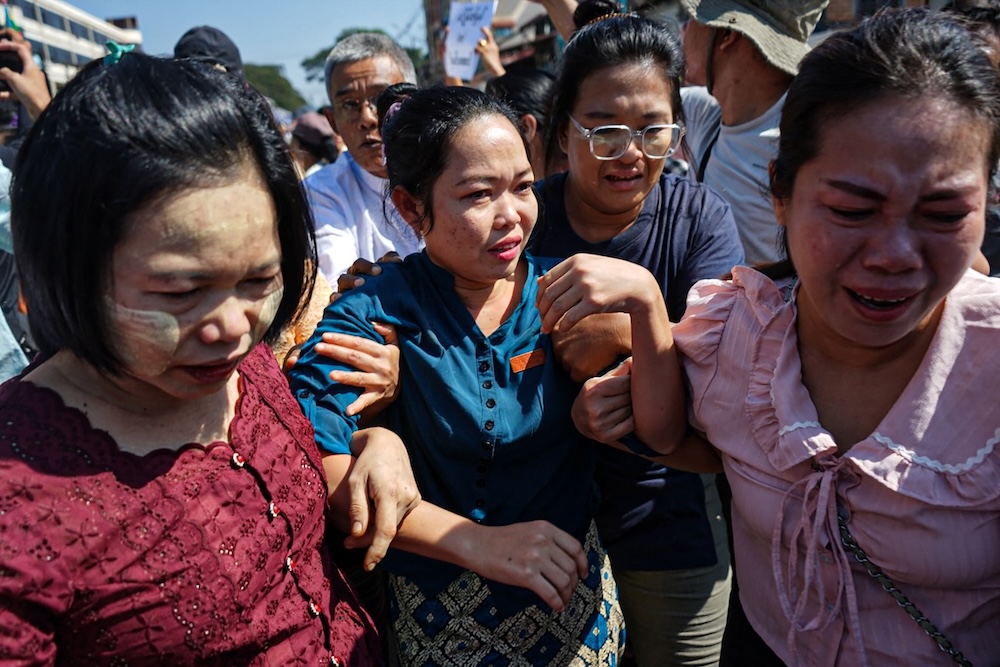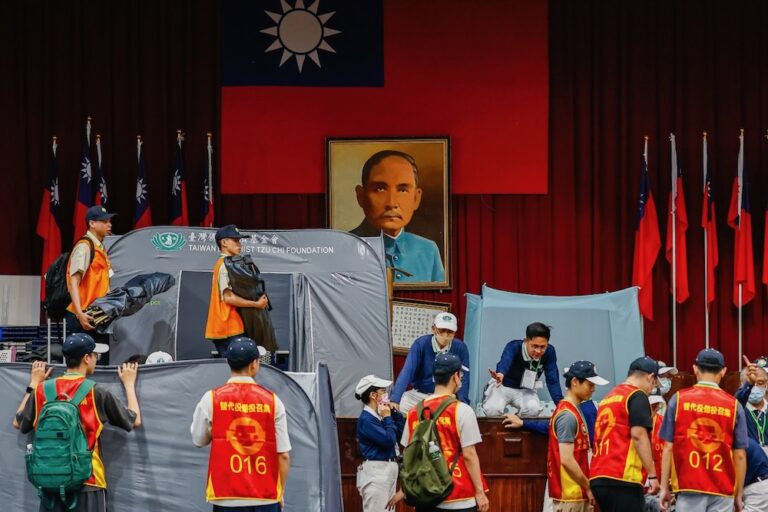January 2025 in Asia-Pacific: A free expression and civic space round-up produced by IFEX's regional editor Mong Palatino, based on IFEX member reports and news from the region
China, Myanmar, and Vietnam are among the most notorious jailers of journalists in the world. Internet shutdowns undermine India’s economy and the people’s right to information. New laws threaten to further erode digital rights in Myanmar and Pakistan. How can Asia’s new governments promote media freedom?
China: Worst jailer of journalists
Asia remains the world’s worst jailer of journalists based on a special report by the Committee to Protect Journalists (CPJ). China has the highest number of journalists behind bars (50), followed by Myanmar (35), and Vietnam (16). Asia’s 111 detained journalists accounted for 30 percent of the global total in 2024. But CPJ suspects that the actual figure for China could be higher, given Beijing’s “pervasive censorship and mass surveillance.”
Maya Wang, associate China director at Human Rights Watch (HRW), summed up the state of freedom of expression in China. “The Chinese government has further tightened abusive laws and imprisoned critics and rights defenders, while making it increasingly difficult to report on government abuses throughout the country.”
HRW’s report on China cited a continuing disregard for basic freedoms in the country. “There is no independent civil society, no freedom of expression, association, assembly or religion, and human rights defenders and other perceived critics of the government are persecuted.”
Freedom House’s latest monitoring cited the court sentencing of human rights defenders, bloggers, filmmakers, and Uyghurs for alleged violations of China’s security laws. It added that economists have been censored for sharing “unpatriotic” reports about the country’s economic conditions. Users of apps like RedNote and a newly released AI model also found out that sensitive topics such as the Tiananmen Massacre, Taiwan, and Covid-19 policies are restricted .
India: Internet shutdowns
In 2024, the Indian government imposed 60 internet shutdowns, amounting to 131 days or 3,160 hours of internet blockade, according to the documentation of IFEX member SFLC.in. It cited a study that the total economic cost of internet disruptions in India amounted to $236.7 million.
From 2012 to 2024, SFLC.in recorded 848 internet shutdowns, an average of approximately 65 disruptions per year. Among the states that suffered prolonged shutdowns were Manipur in 2023 and Jammu and Kashmir in 2021.
Access Now reported that India’s 116 instances of internet shutdowns in 2023 were the highest in the world.
Analysts point out the paradox of India aspiring to become a global leader in digital innovation while the government continuously blocks citizen access to internet services – ostensibly to protect public security. The large-scale intermittent internet disruptions erode the gains in improving digital infrastructure and undermine the people’s right to information.
Repressive new laws in Myanmar and Pakistan
Myanmar’s military government has rolled out a Cybersecurity Law described by legal analysts as another tool aimed at undermining pro-democracy forces. Authorities insist that the law will focus on cyber crimes by banning online gambling, but it has provisions that also penalise the unauthorised use of virtual private networks (VPNs). It will also criminalise the distribution, transfer, and selling of information via digital means that is “inappropriate for the public.” This will further restrict information, since an increasing number of citizens rely on VPNs to obtain independent reports about the country’s situation and to access banned apps and platforms. Furthermore, the law also covers citizens residing in foreign countries, which has grave implications for dissidents and their families in diaspora.
In Pakistan, the country’s president signed a bill amending the Prevention of Electronic Crimes (PECA) and the Digital Nation Pakistan Bill, amid strong opposition from various stakeholders. The two measures were hastily deliberated and passed by the National Assembly and Senate, which prompted journalists to walk out of the press gallery in protest.
The amended PECA criminalises the intentional spreading of “fake news”, but the term is not clearly defined. “We are wary of the potential misuse of this section to target media professionals who share critical news that is then labeled as fake or false news,” said IFEX member Pakistan Press Foundation (PPF) in a statement.
The new law will also establish a Social Media Protection and Regulatory Authority, which has the mandate to control, regulate, block, and censor online content without any judicial oversight. PPF said it “has serious concerns over the federal government’s possible interference in its independent functioning.”
Meanwhile, the Digital Nation law will centralise citizens’ digital identities and governance data, raising concerns about privacy, data misuse, and the introduction of “an invasive framework for mass surveillance.”
IFEX member Bytes For All warned that the new laws “grant the government sweeping powers to censor and criminalize online expression” and “institutionalize Pakistan’s troubling shift towards digital authoritarianism and represent yet another assault on civic space.”
Recommendations for the new governments of Sri Lanka, Indonesia, and Bangladesh
IFEX and 24 other civil society groups sent a letter addressed to Sri Lankan President Anura Kumara Dissanayake urging the recently elected government to uphold and protect press freedom. The letter included specific recommendations to amend or repeal laws that have been weaponised to attack critics, criminalise the work of media, and suppress dissent.
The recommendations for the new government are:
- Reopen or initiate prompt, impartial, and transparent investigations to ensure accountability in cases of violence against the press
- Ensure that law enforcement agencies end the harassment and intimidation of journalists
- Repeal the Online Safety Act
- Repeal the Prevention of Terrorism Act
- Amend the Parliamentary (Powers and Privileges) Act
- Amend the Personal Data Protection Act
- Establish an independent, self-regulatory media commission
HRW sent a letter to Indonesian President Prabowo Subianto Djojohadikusumo urging the leader to promote human rights reforms by prioritising religious freedom, disability rights, women’s rights, freedom from violence and harassment at work, environmental protection, ending discriminatory regulations against LGBTQI+ people, and support for domestic workers. HRW also highlighted the systematic violence in West Papua and the need to address demands for racial and social justice in the province.
HRW’s new report on Bangladesh listed key reform proposals for the interim government that took power after Prime Minister Sheikh Hasina was ousted by a youth-led uprising in August 2024.
“This hard-won progress could all be lost if the interim government does not create swift and structural reforms that can withstand any repression by future governments,” said HRW’s Asia director Elaine Pearson.
The proposals include the enforcement of legal detention practices and the repeal of laws used to target critical voices. HRW noted that the interim government continued to rely on repressive laws after authorities filed cases against 140 journalists perceived to be sympathetic to the previous government.
Women push back against discrimination, harassment, and violence
A web feature by HRW honours the work of Afghan women artists in the grassroots and in the diaspora who use their work as a form of resistance against oppression. In an interview with HRW, conceptual artist Rada Akbar gave this advice to fellow women artists:
“Even in the face of harsh restrictions, your creativity can find a way to bloom, whether through whispered words, hidden sketches, or simply by daring to imagine a world where you are free to express your soul.”
Index on Censorship interviewed Maryam (pseudonym), an Afghan legal scholar and journalist, who conducts online training for women students in light of the secondary and university education ban imposed by Taliban authorities. “They just hear my voice and the teachings I’m offering them. I’m scared and my colleagues are scared, but we go forward, do the job and provide teaching for those who need it.”
Meanwhile, the International Criminal Court (ICC) prosecutor has filed an application for arrest warrants against two senior Taliban leaders for serious abuses against women and girls in Afghanistan. Liz Evenson, HRW’s international justice director, said that the ICC warrant request “offers an essential pathway for a measure of accountability.”
In Pakistan, the Network of Women Journalists for Digital Rights (NWJDR) has issued a statement condemning the vicious harassment and gendered disinformation campaign against senior female journalist Asma Shirazi perpetrated by prominent political leaders. The network vowed to call out and push back against organised operations aimed at attacking women journalists.
“These targeted disinformation and harassment campaigns cannot become the norm. Every time female journalists face gendered harassment, NWJDR will continue to raise its voice and assist survivors in finding avenues to justice.”
In Indonesia, a local court acquitted Septia Dwi Pertiwi, who had been charged with allegedly defaming her former employer after writing about unfair labor practices. Civil society groups, including IFEX member Aliansi Jurnalis Independen, signed a statement condemning the use of the notorious Electronic Information and Transactions Law (UU ITE) to criminalise free speech. “Her prosecution highlights the plight of labor rights defenders in Indonesia, who face criminalisation simply for exercising their freedom of expression in pursuit of justice.”
Human rights groups celebrated the acquittal as they urged the government to review the law.
After enduring exploitative labour practices and bravely exposing the truth, Septia Dwi Pertiwi faced retaliation through defamation charges under the #Indonesia draconian ITE Law.
Her fight was not just for herself but for all workers denied their fundamental rights. Her case… pic.twitter.com/UyrWUEFVVP
— FORUM-ASIA (@forum_asia) January 23, 2025



